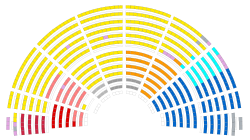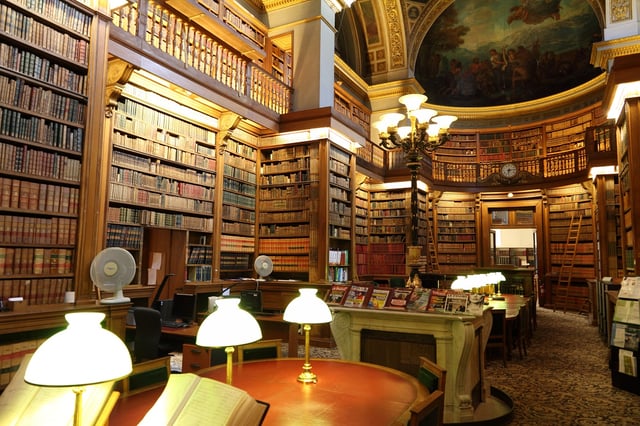Deputy (France)
-lZpIYs7HFDg5k2b4mSQ6BQYHEVlkeM)
Deputy (France)
-lZpIYs7HFDg5k2b4mSQ6BQYHEVlkeM)
National Assembly of France Assemblée nationale | |
|---|---|
| 15th legislature of the French Fifth Republic | |
| Type | |
| Type | Lower house of the French Parliament |
| History | |
| Founded | 4 October 1958 |
| Leadership | |
President | Richard Ferrand, LREM since 12 September 2018 |
| Structure | |
| Seats | 577 seats |
 | |
Political groups |
|
| Elections | |
Voting system | Two-round system |
Last election | 11 and 18 June 2017 |
| Meeting place | |
 | |
| Palais Bourbon, Paris | |
| Website | |
| assemblee-nationale.fr [17] | |
The National Assembly (French: Assemblée nationale; pronounced [asɑ̃ble nasjɔnal]) is the lower house of the bicameral Parliament of France under the Fifth Republic, the upper house being the Senate (Sénat). The National Assembly's legislators are known as députés (French pronunciation: [depyˈte]; "delegate" or "envoy" in English; the word is an etymological cognate of the English word "deputy", which is the standard term for legislators in many parliamentary systems).
There are 577 députés, each elected by a single-member constituency through a two-round voting system. Thus, 289 seats are required for a majority. The assembly is presided over by a president (currently Richard Ferrand), normally from the largest party represented, assisted by vice-presidents from across the represented political spectrum. The term of the National Assembly is five years; however, the President of the Republic may dissolve the Assembly (thereby calling for new elections) unless it has been dissolved in the preceding twelve months. This measure is becoming rarer since the 2000 referendum reduced the presidential term from seven to five years: a President usually has a majority elected in the Assembly two months after the presidential election, and it would be useless for him/her to dissolve it for those reasons.
Following a tradition started by the first National Assembly during the French Revolution, the "left-wing" parties sit to the left as seen from the president's seat, and the "right-wing" parties sit to the right, and the seating arrangement thus directly indicates the political spectrum as represented in the Assembly. The official seat of the National Assembly is the Palais Bourbon on the banks of the river Seine; the Assembly also uses other neighbouring buildings, including the Immeuble Chaban-Delmas on the rue de l'Université. It is guarded by Republican Guards.
National Assembly of France Assemblée nationale | |
|---|---|
| 15th legislature of the French Fifth Republic | |
| Type | |
| Type | Lower house of the French Parliament |
| History | |
| Founded | 4 October 1958 |
| Leadership | |
President | Richard Ferrand, LREM since 12 September 2018 |
| Structure | |
| Seats | 577 seats |
 | |
Political groups |
|
| Elections | |
Voting system | Two-round system |
Last election | 11 and 18 June 2017 |
| Meeting place | |
 | |
| Palais Bourbon, Paris | |
| Website | |
| assemblee-nationale.fr [17] | |
Relationships with the executive

Jacques Chaban-Delmas was three times President of the Assembly between 1958 and 1988
The President of the Republic can decide to dissolve the National Assembly and call for new legislative elections. This is meant as a way to resolve stalemates where the Assembly cannot decide on a clear political direction. This possibility is seldom exercised. The last dissolution was by Jacques Chirac in 1997, following from the lack of popularity of prime minister Alain Juppé; however, the plan backfired, and the newly elected majority was opposed to Chirac.
The National Assembly can overthrow the executive government (that is, the Prime Minister and other ministers) by a motion of no confidence (motion de censure). For this reason, the prime minister and his cabinet are necessarily from the dominant party or coalition in the assembly. In the case of a president and assembly from opposing parties, this leads to the situation known as cohabitation; this situation, which has occurred three times (twice under Mitterrand, once under Chirac), is likely to be rarer now that presidential and assembly terms are the same length.
While motions de censure are periodically proposed by the opposition following government actions that it deems highly inappropriate, they are purely rhetorical; party discipline ensures that, throughout a parliamentary term, the government is never overthrown by the Assembly.[2] Since the beginning of the Fifth Republic, there has only been one single successful motion de censure, in 1962 in hostility to the referendum on the method of election of the President,[3] and President Charles de Gaulle dissolved the Assembly within a few days.[4]
The government (the prime minister and the minister of relationships with parliament) used to set the priorities of the agenda for the assembly's sessions, except for a single day each month. In practice, given the number of priority items, it meant that the schedule of the assembly was almost entirely set by the executive; bills generally only have a chance to be examined if proposed or supported by the executive. This, however, was amended on 23 July 2008. Under the amended constitution, the government sets the priorities for two weeks in a month. Another week is designated for the assembly's "control" prerogatives (consisting mainly of verbal questions addressed to the government). And the fourth one is set by the assembly. Also, one day per month is set by a "minority" (group supporting the government but which is not the biggest group) or "opposition" (group having officially declared it did not support the government) group.
Legislators of the assembly can ask written or oral questions to ministers. The Wednesday afternoon 3 p.m. session of "questions to the Government" is broadcast live on television. Like Prime Minister's Questions in Britain, it is largely a show for the viewers, with members of the majority asking flattering questions, while the opposition tries to embarrass the government.[5]
History
The history of national representation for two centuries is closely linked to history of the democratic principle and the uneven road that it had to go before finding in the French institutions the consecration which is its own today.
Although the French have periodically elected representatives since 1789, the mode of appointment and the powers of these representatives have varied considerably according to the times, the periods of erasure of the parliamentary institution generally coinciding with a decline in public liberties. In this respect, the names are not innocent. The name of National Assembly, chosen in the fervor of 1789, just reappears – if we except the short parenthesis of 1848 – in 1946. In the meantime, more or less reductive appellations ("Conseil des Cinq-Cents", "Instituted by the Constitution of the year III in August 1795," "Chamber of deputies of the departments", "House of Representatives", "Legislative body", "Chambers of deputies", etc.) show, to varying degrees, the reluctance or even the declared hostility of some governments or governments to the principle of the (indirect) sovereignty of the people.
Elections

The Palais Bourbon in Paris, where the National Assembly meets

Ceiling paintings in the Library of the Assemblée nationale in the Palais Bourbon, on a series of cupolas and pendentives, are by Eugène Delacroix.
Since 1988, the 577 deputies are elected by direct universal suffrage with a two-round system by constituency, for a five-year mandate, subject to dissolution. The constituencies each have approximately 100,000 inhabitants. The electoral law of 1986 specifies that variations of population between constituencies should not, in any case, lead to a constituency exceeding more than 20% the average population of the constituencies of the département.[6] However, districts were not redrawn between 1982 and 2009. As a result of population movements over that period, there were inequalities between the less populous rural districts and the urban districts. For example, the deputy for the most populous constituency, in the department of Val-d'Oise, represented 188,000 voters, while the deputy for the least populous constituency, in the department of Lozère, represented only 34,000.[7] The constituencies were redrawn in 2009,[8] but this redistribution was controversial.[9] Among other controversial measures, it created eleven constituencies and seats for French residents overseas, albeit without increasing the overall number of seats beyond 577.[10][11]
To be elected in the first round of voting, a candidate must obtain at least 50% of the votes cast, with a turn-out of at least 25% of the registered voters on the electoral rolls. If no candidate is elected in the first round, those who poll in excess of 12.5% of the registered voters in the first-round vote are entered in the second round of voting. If no candidate comply such conditions, the two highest-placing candidates advance to second round. In the second round, the candidate who receives the most votes is elected. Each candidate is enrolled along with a substitute, who takes the candidate's place in the event of inability to represent the constituency, when the deputy becomes minister, for example.
The organic law of 10 July 1985 established a system of party-list proportional representation within the framework of the département. It was necessary within this framework to obtain at least 5% of the vote to elect an official. However, the legislative election of 1986, carried out under this system, gave France a new majority which returned the National Assembly to the plurality voting system described above.
Of the 577 elected deputies, 539 represent Metropolitan France, 27 represent the overseas departments and overseas collectivities, and 11 represent French residents overseas.[12]
Conditions and privileges of deputies

Députés wear tricolor sashes on official occasions outside the Assembly or on public marches; Martine Billard (then Greens, currently Left Party) is pictured here.
Assembly legislators receive a salary of €7,043.69 per month. There is also the "compensation representing official expenses" (indemnité représentative de frais de mandat, IRFM) of €5,867.39 per month to pay costs related to the office, and finally a total of €8,949 per month to pay up to five employees. They also have an office in the Assembly, various perquisites in terms of transport and communications, social security, a pension fund, and unemployment insurance. Under Article 26 of the Constitution, deputies, like Senators, are protected by parliamentary immunity. In the case of an accumulation of mandates, a deputy cannot receive a wage of more than €9,779.11.
Accumulation of mandates and minimum age
The position of deputy of the National Assembly is incompatible with that of any other elected legislative position (Senator or since 2000, Member of European Parliament) or with some administrative functions (members of the Constitutional Council of France and senior officials such as prefects, magistrates, or officers who are ineligible for Department where they are stationed). Deputies may not have more than one local mandate (in a municipal, intercommunal, general, or regional council) in addition to their current mandate. Since the 2017 general election, deputies cannot hold an executive position in any local government (municipality, department, region). However, they can hold a part-time councillor mandate. As of July 2017, 58% of deputies hold such a seat. Since 1958, the mandate is also incompatible with a ministerial function. Upon appointment to the Government, the elected deputy has one month to choose between the mandate and the office. If he or she chooses the second option, then they are replaced by their substitute. One month after the end of his cabinet position, the deputy returns to his seat in the Assembly.
To be eligible to be elected to the National Assembly, one must be at least 18[13] years old, of French citizenship, and not subject to a sentence of deprivation of civil rights or to personal bankruptcy.
Current legislature
Parliamentary groups
| Parliamentary group | Deputies | Related | Total | President | ||
|---|---|---|---|---|---|---|
| LREM | La République En Marche | 303 | 2 | 305 | Richard Ferrand | |
| LR | The Republicans | 99 | 5 | 104 | Christian Jacob | |
| MoDem | Democratic Movement and affiliated | 40 | 6 | 46 | Marc Fesneau | |
| SOC | Socialists and affiliated | 25 | 4 | 29 | Valérie Rabault | |
| UAI | UDI, Agir and Independents | 26 | 2 | 28 | Jean-Christophe Lagarde | |
| LT | Libertés and Territories | 18 | 0 | 18 | Bertrand Pancher and Philippe Vigier | |
| FI | La France Insoumise | 17 | 0 | 17 | Jean-Luc Mélenchon | |
| GDR | Democratic and Republican Left | 16 | 0 | 16 | André Chassaigne | |
| NI | Non-inscrits | – | – | 14 | – | |
Bureau of the National Assembly
| Post | Name | Constituency | Group | |
|---|---|---|---|---|
| Vice President in charge of international relations | Carole Bureau-Bonnard | Oise's 6th | LREM | |
| Vice President in charge of representatives of interest groups and study groups | Hugues Renson | Paris's 13th | LREM | |
| Vice President in charge of communication and the press | Sylvain Waserman | Bas-Rhin's 2nd | LREM | |
| Vice President in charge of the artistic and cultural heritage of the National Assembly | Francis Vercamer | Nord's 7th | UAI | |
| Vice President in charge of the application of the deputy's statute | Annie Genevard | Doubs's 5th | LR | |
| Vice President in charge of the admissibility of proposals of law | Marc Le Fur | Côtes-d'Armor's 3rd | LR | |
| Quaestor | Florian Bachelier | Ille-et-Vilaine's 8th | LREM | |
| Laurianne Rossi | Hauts-de-Seine's 11th | LREM | ||
| Éric Ciotti | Alpes-Maritimes's 1st | LR | ||
| Secretary | Lénaïck Adam | French Guiana's 2nd | LREM | |
| Ramlati Ali | Mayotte's 1st | LREM | ||
| Danielle Brulebois | Jura's 1st | LREM | ||
| Luc Carvounas | Val-de-Marne's 9th | SOC | ||
| Lionel Causse | Landes's 2nd | LREM | ||
| Alexis Corbière | Seine-Saint-Denis's 7th | FI | ||
| Laurence Dumont | Calvados's 2nd | SOC | ||
| Marie Guévenoux | Essonne's 9th | LREM | ||
| Annaïg Le Meur | Finistère's 1st | LREM | ||
| Sophie Mette | Gironde's 9th | MoDem | ||
| Gabriel Serville | French Guiana's 1st | GDR | ||
| Guillaume Vuilletet | Val-d'Oise's 2nd | LREM | ||
Presidencies of committees
| Standing committees | President | Group | |
|---|---|---|---|
| Cultural and Education Affairs Committee | Bruno Studer | LREM | |
| Economic Affairs Committee | Roland Lescure | LREM | |
| Foreign Affairs Committee | Marielle de Sarnez | MoDem | |
| Social Affairs Committee | Brigitte Bourguignon | LREM | |
| National Defence and Armed Forces Committee | Jean-Jacques Bridey | LREM | |
| Sustainable Development, Spatial and Regional Planning Committee | Barbara Pompili | LREM | |
| Finance, General Economy and Budgetary Monitoring Committee | Éric Woerth | LR | |
| Constitutional Acts, Legislation and General Administration Committee | Yaël Braun-Pivet | LREM | |
| Other committee | President | Group | |
| European Affairs Committee | Sabine Thillaye | LREM | |
Deputies
List of deputies of the 11th National Assembly of France
List of deputies of the 12th National Assembly of France
List of deputies of the 13th National Assembly of France
List of deputies of the 14th National Assembly of France
List of deputies of the 15th National Assembly of France
See also
Congress of the French Parliament
Chamber of Deputies (France)
French Parliament
Senate (France)
Politics of France